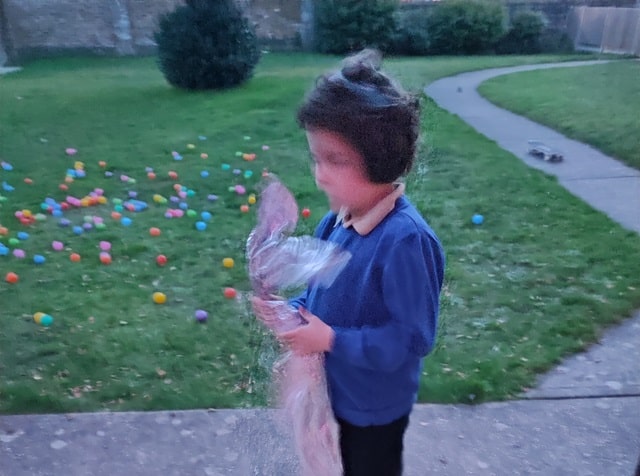
Claire Campbell is a Thanet mum-of-three and formerly an SEN teacher working in a specialist school in Broadstairs where all children are autistic with complex learning needs.
She is also PA for Beau, taking him out at weekends or in school holidays to support his mum getting respite and the youngster accessing activities.
Her monthly columns this year aimed to raise awareness and cultivate change:
As the year slowly trundles along to its end, it is a time for reflection and for setting all those new goals for the year to come. It has therefore been a whole year since I first set my family’s new year’s resolution to support better community access for families with children with SEND, and time to write my final column.
Last month I introduced the idea of a stone painting community group, and I also shared with you Stefan’s story. When I met Stefan’s mum, Emma, one of the things that she was very clear about is how problematic it is that autism is seen as a deficit and how parents must focus on this in order to get support. Autism is often pathologised and discussed with deficit focused language. Autism is a neurological difference and there are so many wonderful positives that come from autistic minds and being able to celebrate and have pride in these aspects should not negate access to necessary support and care.
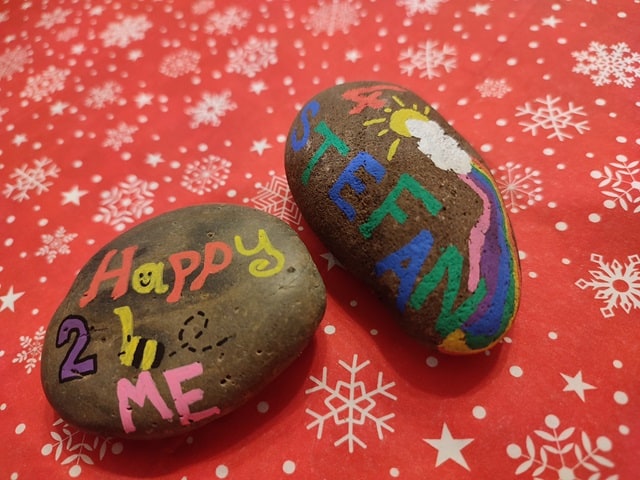
It is no secret that I am interested in autism, neuro-divergence, and community. I seem to be drawn to it in my life both professionally and personally. I read about it and learn as much as I can about it. And I love a film, TV series, podcast or documentary that relates to the autistic or neuro-divergent community. I listened to a podcast from Aucademy called ‘Especially Interesting’, watched a series on BBC called ‘What’s Your Thing?’ and a documentary on Netflix called ‘Speed Cubers’. These three examples have autism as a theme whether it is explicit or not and through their content we can explore in more depth the ideas of autism represented as a deficit that Emma so rightly addresses.
‘What’s Your Thing?’ is a BBC series of 5 short episodes exploring quirky interests from dog shows to gooseberry growing. Autism is mentioned explicitly in one episode but in my opinion it is visible throughout. Because these little pockets of community that allow people to be their weird and wonderful selves and to become really committed to a special interest are just the kind of place where diagnosed, undiagnosed and self-diagnosed autistic people alike are bound to end up. One episode nearly wasn’t able to happen due to the community being so against any journalists joining their event. They didn’t want another opportunity for people to make fun of them as they were so used to this being the majority reaction to their hobby. Despite the sense of community that was shown so well in the interests explored in ‘What’s Your Thing?’, this difference in choosing obscure hobbies is mocked by many and I see here a mirroring of that deficit-based attitude towards autism.
The ‘Especially Interesting’ podcast hosts autistic guests who info dump on their special interests, celebrating this awe-inspiring feature of many autistic minds. Upbeat, fascinating and deliciously moreish. I raced through the episodes finding as many opportunities as I could to fit in time to listen whether I was out for a run, driving to work, doing housework or on the school run, it always left me in a good mood. On this podcast, autistic guests come on to info dump on their special interests. You get depth and details about things you may have an interest in yourself or indeed things you may have no clue about.
Interestingly, my favourite two episodes were on topics I know very little about and actually have very little interest in – iPhones and coffee! I don’t have an iPhone and I am not particularly interested in the hardware or software; and I dislike the taste of coffee and don’t drink it. This made it clear to me that the content, whilst fascinating, wasn’t why I was drawn into this podcast. I just really love hearing people so animatedly and passionately discuss their interests. I love the detail. The iPhone episode was so methodically presented and I loved this delivery style. The coffee episode contrastingly was a very dynamic and organic discussion. I loved them both.
This podcast is a real thumping punch of diversity-affirming, autism positivity. It really celebrates the focus on detail and depth that can be a characteristic of many autistic brains. This is perhaps not surprising seen as Aucademy seeks to educate about the autistic experience and is made up entirely of autistic teachers, researchers and trainers.
In the ‘Speed Cubers’ documentary, we see an interesting look at both sides of the coin. But despite the success and skill of the autistic individual who is breaking world record after world record for many variations of Rubik’s Cube competitions, the deficit focus on autism can be seen clearly. Autism is presented as something to fight against and the differences it brings as something to try to train away. What is a lovely tonic to this however is the understanding built and offered to this individual, particularly offered by his fellow competitors. They respect him for his skill and talent and they understand that he finds his emotions overwhelming when experiencing those big feelings that come with competing so highly and with such passion for an activity.
Unfortunately the world we live in isn’t particularly understanding of people having these struggles. We all hide emotions on a daily basis. We hide those that are deemed less acceptable to be viewed by others. Feelings like anger, disappointment, jealousy. People who are unable to hide these emotions are seen as less-than. Even if it is a fleeting expression of self in an intense moment and, given time and space, the person can find ways to regulate and be more objective, that person is still seen as less-than. So people are urged to hide and push down parts of themselves.
For me, it seems really clear that if society was more knowledgeable, understanding and accepting of difference and in particular the differences that autism may bring, then the view of autism as a deficit would be significantly reduced. Are autistic individuals disabled by their autism or are they disabled by a society that doesn’t allow them to express themselves safely, doesn’t support their difficulties in order to benefit greatly from all their remarkableness?
There is a common metaphor where a cat is expected to behave like a dog. We would find the cat to be a pretty poor example of a dog and could list a multitude of things it is doing wrong but if we simply accepted that it was not a dog and was in fact a cat, we can then value all the unique qualities a cat has that make it great. One of my favourite quotes from ‘What’s Your Thing?’ came from the dog show episode where a lady speaks about talking to her dog and says that ‘dogs have a language. It’s just their own different language and you have to learn it’. I think we were supposed to find her delightfully nutty but in my opinion it is clear that she’s completely right.
A few months back I shared a video that I created for an open art exhibition in Margate (video can be viewed on this link: https://thingsihavelearnedthehardway.com/claire-campbell/) where I had juxtaposed photos of children engaging with play equipment differently – children playing ‘the right way’ and Beau playing ‘differently’. In this example Beau is the ‘cat’. If you expect him to use the slide or the see saw like a dog then you will be mightily disappointed but if you allow him to be himself, there are all the same outcomes expressed at the end of my video – laughter, joy, connection.
In an episode of ‘What’s Your Thing?’ we meet an autistic individual who used to stand on a motorway bridge and wave at trucks. He loves trucks and talks so joyfully about them. We are told however that he is autistic and needs constant care and so can no longer come out to wave at trucks. I have no details about this individual’s needs, some of which will be related to his age, but I find it so hard to believe that a short drive and a sit outside waving at trucks is an unachievable activity. Especially considering all we know about the mental health and wellbeing benefits of being outdoors and engaging in interests. Is it the fact that others may find waving at trucks strange, and that it is a repetitive indulgence in a special interest (something which may be pathologised as unhealthy in its lack of variety) which actually stops this activity from being attempted with this man?
I know these are complex questions and it may feel like I’m not exactly ending my year of columns on a positive note, but it is actually with a huge amount of hope that I write this column. I am so hopeful that change can happen and I think having Aucademy podcasts and TV programmes like ‘What’s Your Thing?’ normalising people having a deep interest in a variety of weird and wonderful things is a really positive thing. The judgement, the bullying, the othering and the trauma that comes from that is real. It exists. And in many cases, such as Stefan’s, it has harrowing consequences. I do not wish to sidestep that in any way. But the fact that these podcasts exist, these TV programmes exist and of course that these people exist is a very positive thing. People who know there are real risks in them standing up, proudly being themselves and sharing their differences with the world. It is brave. Definitely. But it is also hopeful. And so as I sign off I leave you with more stories of hope and bravery.
This week I heard from my brother-in-law who told me he has enjoyed reading my columns and that they led him to make certain considerations in his workplace at Derby County Council. All the reception and security staff at the council have now accessed Autism and ADHD awareness training and experts from their Adult Learning team have had a walk around the Council House reception to consider adaptations that can be made to avoid sensory overload. He has even been able to procure funding for some sensory borrow bags that will be arriving in the new year. This is exactly what I hoped for when I started writing these columns. To have these conversations out there, for these issues to be on people’s minds and for them to consider if there are any small adaptations they could make to support neuro-diversity in their own lives.
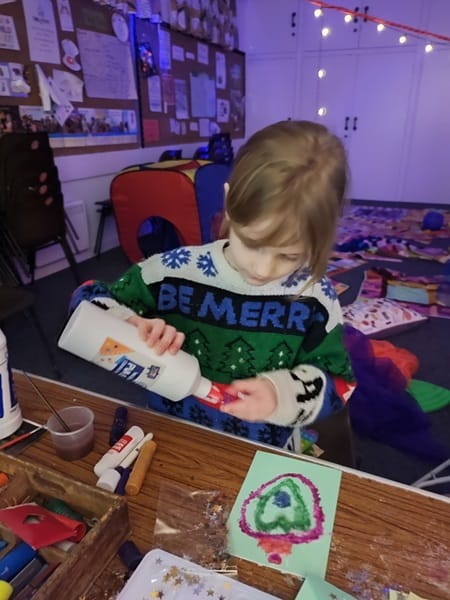
In some of the recent work that I have taken on, I have been able to build relationships with some wonderful individuals with neuro-diversity affirming ideas and attitudes. It is wonderful to be in such company and the ‘See Me’ group that I mentioned last month is a very neuro-diversity affirming space. So I would like to take this final opportunity to promote this group again. A warm, welcoming, relaxed neurodivergent play space that provided the perfect space for my daughter to be herself and explore as we venture onto the pathway to explore her own neurodivergence and access an autism assessment. We took Beau along with us also last time and he was welcomed just as warmly and experienced much joy in this setting.
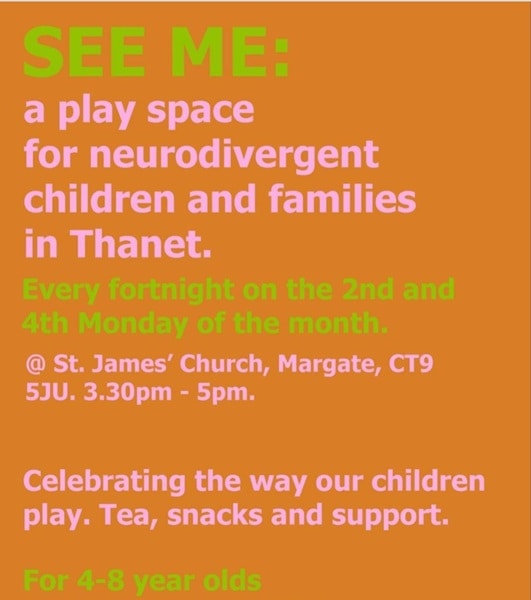
And finally, I had the absolute pleasure of attending ‘a night for weird folk’ at Margate Arts Club, hosted by Bower Street Morris last week. I had seen the weird folk nights advertised previously and I was so pleased that our Wantsum Women Morris side were invited along to dance at one. It often happens that my Morris dancing hobby becomes a theme of my columns or at least gets a mention. I think in exploring programmes like ‘What’s Your Thing?’ I have a better realisation of why this is. I always focused on the community element of this group and how it is a really great opportunity to feel that engagement to and connection with the place you live and people around you. And this is a big part of it but actually, we are a diverse group of women and a group that was formed by a brave woman determinedly wedging her foot in a door that had previously been closed to all women.
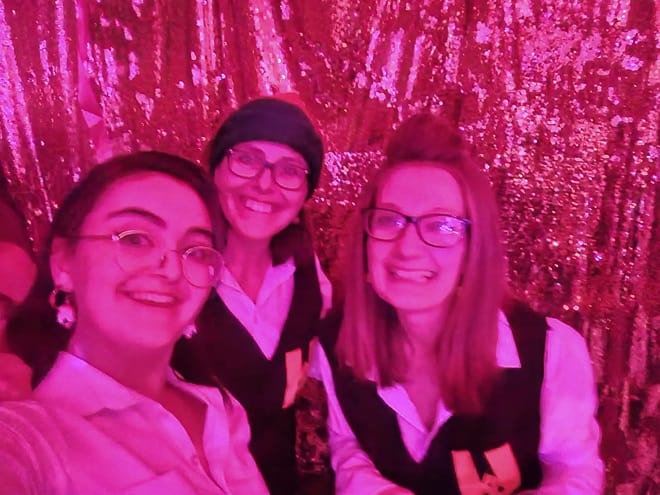
Inclusion and equality are also a big part of our group and something I hold great pride in. Bower Street Morris have their own story about their journey to being such a vibrant and inclusive side. Which leads them to rehearse and host events in a ‘queer-run LGBTQIA+-focused, anti-racist intersectional organisation and community space’. An open and inclusive space that welcomes all who are respectful and does ‘not tolerate racism, transphobia, homophobia, biphobia, xenophobia, ableism, ageism, body-shaming, slut-shaming or misogyny’ (information taken from Margate Arts Club website).
And like in ‘What’s Your Thing?’ it was a wonderful and safe space for us to be our weird and wonderful selves and for us to explore the folk traditions of our community however strange they may seem to others. Add in a fabulous ceilidh with an awesome caller and you have a night that even the slightly foggy head of the morning after couldn’t put a damper on.
As neuro-divergence, whether it is diagnosed or undiagnosed, clearly exists in this space, I see myself more clearly. Am I an undiagnosed autistic person? It would explain my daughter’s current journey to diagnosis, it would explain why I am drawn to autism both professionally and personally and it would also explain an awful lot more about my previous life experiences.
And so my family end the year with many questions and starting new journeys of discovery but it feels like an excellent place to be. We are doing this surrounded by understanding, like-minded people, and safe spaces to be ourselves. This year of columns has ended up being a bit of a journey of self-discovery and that journey has only just begun.
If Kathy will have me, I would love to write again to share details of the stone painting group when this is organised. But for now, all that is left to say is a huge thank you to everyone who has read and shared my columns. I hope you all find your safe space for you and your children to be your wonderful selves.

